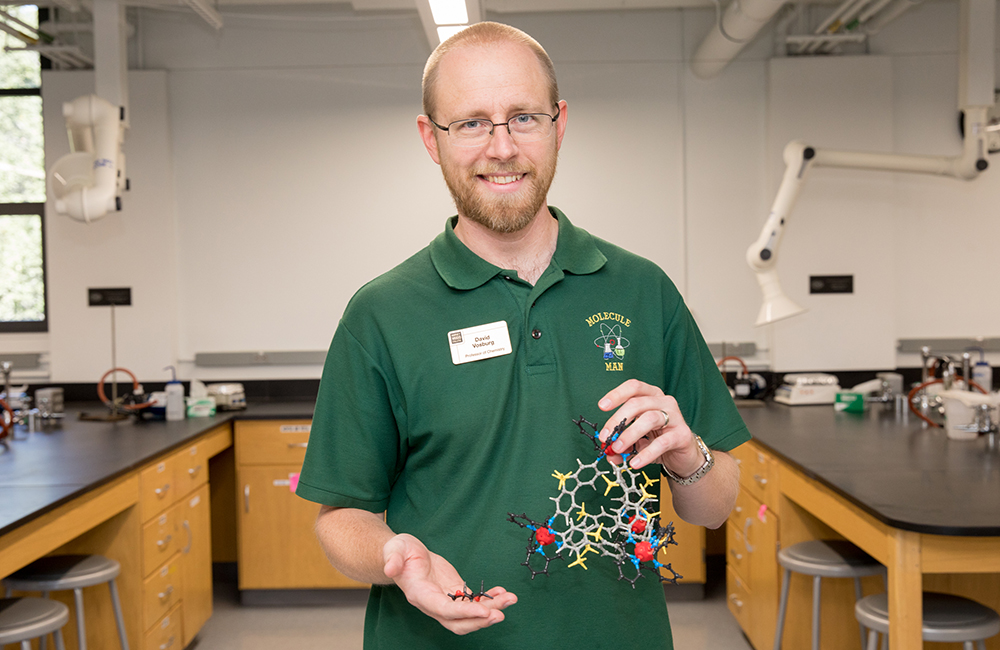Vosburg Awarded Fulbright Scholar Grant
April 26, 2018
In his lab at Harvey Mudd College, chemistry professor David Vosburg seeks to make medicinally useful molecules in new ways, especially biomimetic ways, using chemistry that imitates how such molecules are believed to be formed naturally in plants. This fall, Vosburg will continue his research with a new layer of complexity: He’ll do it in Spanish.
The beneficiary of a Fulbright Scholar grant, Vosburg will spend the 2018-2019 academic year in the Department of Chemistry at the University of Guanajuato, Mexico. He will join the lab of Professor Rocío Gámez-Montaño, an expert in green, multicomponent reactions, and the two will work to develop environmentally friendly methods of producing new molecules for medicinal, agrochemical, optical and educational applications.
Vosburg, his wife and their three children have been studying Spanish in anticipation of the full-immersion experience, trying to incorporate it into their daily lives as much as possible. Vosburg is learning scientific Spanish as well, on top of the usual verb conjugations and conversational phrases.
“I found a Spanish translation of an American Chemical Society Green Chemistry Institute magazine, which has helped me work on my scientific Spanish,” he says. “I knew that a successful Fulbright application would also involve a Skype interview in Spanish, but I did not realize until just before it happened that it would be with five Mexican chemists and would include very technical questions. That interview was one of the hardest things I’ve ever done, but somehow I did well enough to be selected for a Fulbright. Thankfully many scientific words in Spanish are very similar to the corresponding English words, but this is an area in which I’m sure I’ll grow over the next year.”
No doubt all five of the Vosburgs will grow a lot over the next year, which is part of the point of the adventure. In addition to the outstanding research opportunities as a member of the Gámez-Montaño lab, Vosburg had personal reasons for choosing Mexico: Of the Vosburgs’ three children, two are of Mexican descent. “We’re interested in learning more about Mexican culture and the Spanish language both for their benefit and as a family,” he says.
Desiring a truly immersive Spanish language experience, Vosburg was interested in finding a location where a lack of other English speakers would force the family to speak Spanish. “Unlike Mexico City, Guadalajara, Tijuana or San Miguel de Allende,” he says, “there are not so many English speakers in Guanajuato; it is very much a Spanish-speaking city. We can therefore more easily avoid surrounding ourselves with other Americans and truly experience Mexican culture.” (Culturally, the Vosburgs have chosen well: Guanajuato City is a UNESCO World Heritage site and home of the annual International Cervantes Festival, a two-week celebration of music, art and theater.)
Though this isn’t the first time the Vosburgs have spent a year abroad—the family spent a sabbatical year in Cambridge, England—the language barrier and cultural differences will likely make it more challenging. “All three of my kids will be attending a Spanish-speaking school, and my wife and I will be mainly conversing with people in Spanish,” Vosburg says. “It is a big step of faith, but we’re looking forward to a full immersion experience in Mexico. We hope to learn a lot from people there and to build robust cross-cultural friendships and partnerships.”
Vosburg anticipates developing friendships and partnerships between Harvey Mudd and the University of Guanajuato, as well. “I am certain that my sabbatical in Mexico will lead to personal renewal and professional flourishing,” he says, “and that it will greatly benefit both Harvey Mudd College—which has a growing Latino student population—and the University of Guanajuato beyond the duration of my own stay. My work on green, multicomponent reactions in the Gámez-Montaño group will contribute to our global society as we develop new applications for bis-heterocycles and green chemistry in medicine, agrochemicals, optics, and chemical education.”
